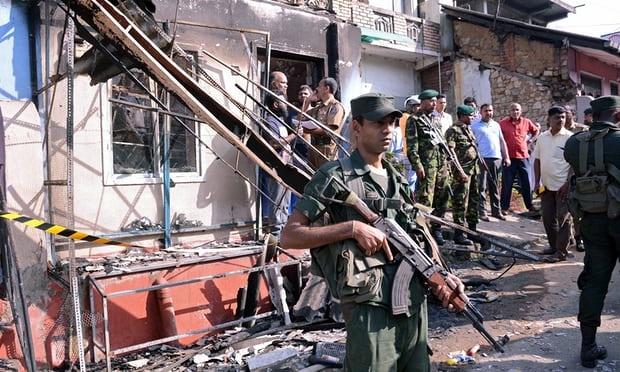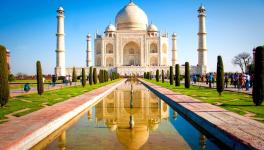Sri Lanka Declares Emergency After Communal Riots

Image Courtesy: The Guardian
After anti-Muslim arson and attacks over the weekend near Kandy in the central highlands, the Sri Lanka government on 6 March declared a 10-day state of National Emergency and deployed heavily armed elite commandos and the army in the disturbed region.
The central district was already under curfew after allegedly a mob of Buddhists attacked Muslim shops, homes and mosques on 5 March. This was in reaction to an incident last week in which a Buddhist lorry driver was reportedly killed by three men alleged to have been Muslims, over some altercation.
The latest incidents come after simmering tensions between Muslim and Buddhist communities have repeatedly come to a flashpoint in recent years. Last week, mobs had attacked Muslim businesses and a mosque in Ampara in eastern Sri Lanka.
Nearly 70% of Sri Lanka’s 21 million population is Buddhist, mainly of the Theravada lineage. About 9% are Muslims and 10% Christians, besides 13% Hindus.
Declaration of Emergency gives sweeping powers to the security forces, including arrest and detention of suspects for long periods. It is after a seven year gap that the state of Emergency has been declared. Sri Lanka remained under National Emergency for 30 years due to the Tamil insurgency in the country’s northern parts. After the Tamil rebels were crushed in a military offensive in 2009, the Emergency was finally lifted in August 2011.
Recent years have seen increasing tension between hardline Buddhist groups, mainly led by the Buda Bala Sena (BBS) which has reportedly launched a campaign against production of halal food (2013-14), proposed a ban on burka (2014), and has been allegedly involved in various attacks on Muslims. There have been incidents of communal violence at Aluthgama-Dhargar town (2014), Grandpass (2014), Mahiyangana (2013).
The secretary general of BBS led by Galagoda Aththe Gnanasara has emerged as a fundamentalist and violent outfit with increasing clout in Sri Lanka. Its leaders are facing trial in last year’s communal incidents. BBS has links with Myanmar’s 969 Movement, another radical Buddhist organization.
In 2014, Galagodaatte Gnanasara told reporters that BBS was in talks with India’s Rashtriya Swayam Sevak Sangh (RSS) to create a “Buddhist-Hindu peace zone” in South Asia to counter Islamic extremism.
Get the latest reports & analysis with people's perspective on Protests, movements & deep analytical videos, discussions of the current affairs in your Telegram app. Subscribe to NewsClick's Telegram channel & get Real-Time updates on stories, as they get published on our website.
























